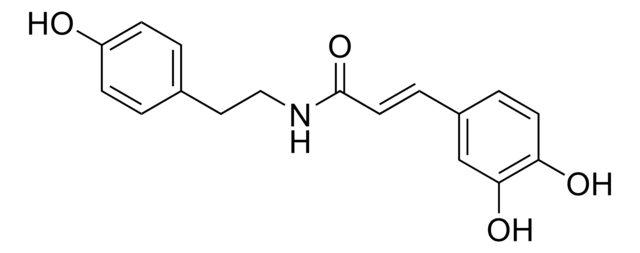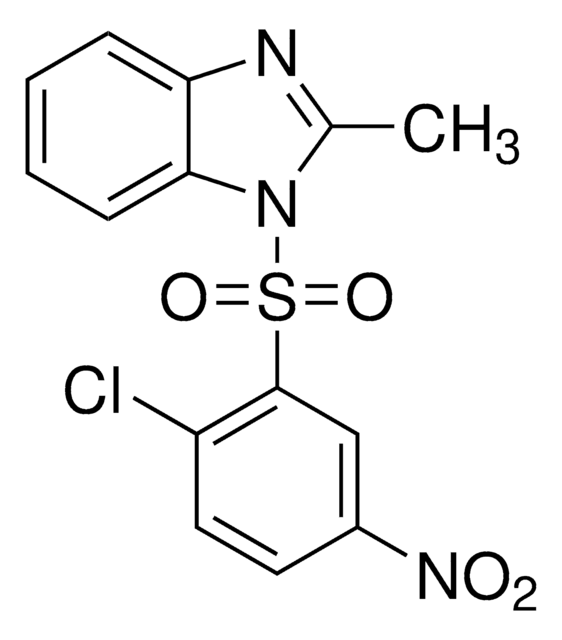375240
HNF4 Antagonist, BI6015
The HNF4 Antagonist, BI6, also referenced under CAS 93987-29-2, controls the biological activity of HNF4.
同義詞:
HNF4 Antagonist, BI6015, 2-Methyl-1-(2-methyl-5-nitrophenylsulfonyl)-1H-benzo[d]imidazole, Hepatocyte Nuclear Factor4 Antagonist
登入查看組織和合約定價
全部照片(2)
About This Item
推薦產品
品質等級
化驗
≥99% (HPLC)
形狀
powder
製造商/商標名
Calbiochem®
儲存條件
OK to freeze
protect from light
顏色
beige
溶解度
DMSO: 10 mg/mL
運輸包裝
ambient
儲存溫度
2-8°C
SMILES 字串
CC1=NC2=C(N1S(C3=CC([N+]([O-])=O)=CC=C3C)(=O)=O)C=CC=C2
InChI
1S/C15H13N3O4S/c1-10-7-8-12(18(19)20)9-15(10)23(21,22)17-11(2)16-13-5-3-4-6-14(13)17/h3-9H,1-2H3
InChI 密鑰
ILVCPQPMRPHZSG-UHFFFAOYSA-N
一般說明
A cell-permeable phenylsulfonylbenzimidazole compound that is shown to dock in the ligand-binding pocket of both HNF4α and HNF4γ via in silico structural analyses and antagonizes HNF4α DNA binding activity (by 93% after 10 µM overnight treatment of HepG2 cells), effectively inhibiting HNF4α-dependent cellular activities, including HNF4α mRNA transcription (by 62% in murine insulinoma MIN6 and 84% in human hepatoma HepG2 cultures after 5 h and 48 h 5 µM inhibitor treatment, respectively) and OTC (omithine transcarbamoylase) promoter transcription (by 85% & >95% in human HNF4α-transfected HepG2 & CV-1 cells, respectively; 48 hr 1 µM treatment). HNF4γ inhibition by BI6015 is also reported to indirectly lead to decreased binding of transactivators, E47 & PDX-1, to insulin promoter in T6PNE cells (48 h 5 µM treatment). Although BI6015 is found to exhibit cancer-selective cytotoxicity toward a panel of 58 human cancer cells and Hep3B-Luc (Effective conc. 1 to 10 µM), but not primary murine hepatocytes, it does cause hepatic steatosis both in vitro (primary murine hepatocytes; 5 µM for 3 days) and in mice in vivo (10 to 30 mg/kg/day for 5 days via i.p.) and is effectively metabolized by liver enzymes, limiting its in vivo efficacy in treating human Hep3B-derived liver tumor in mice. BI6015 also inhibits Human CYP450 2C19 and rat L-type calcium channel (by 94% and 83%, respectively, at 10 µM), but not PPARγ or a panel of 41 receptors/enzymes of human, mouse, and rat origin.
A cell-permeable phenylsulfonylbenzimidazole that is shown to dock in the ligand-binding pocket of both HNF4α and HNF4γ and antagonize HNF4α DNA binding activity in HepG2 cells (by 93%; 10 µM overnight), effectively inhibiting HNF4α-dependent cellular activities (Effective conc. 1 to 5 µM). HNF4γ inhibition by BI6015 can also lead to decreased insulin promoter binding by transactivators E47 & PDX-1 in T6PNE cells (5 µM 48 h). Although BI6015 is found to exhibit cancer-selective cytotoxicity toward a panel of 58 human cancer cells and Hep3B-Luc (Effective conc. 1 to 10 µM), but not primary murine hepatocytes, it does cause hepatic steatosis both in vitro and in mice in vivo, limiting its use in animal studies. BI6015 also inhibits Human CYP450 2C19 and rat L-type calcium channel (by 94% and 83%, respectively, at 10 µM), but not PPARγ or a panel of 41 receptors/enzymes of human, mouse, and rat origin.
生化/生理作用
Cell permeable: yes
Primary Target
HNFα & γ
HNFα & γ
Reversible: yes
包裝
Packaged under inert gas
警告
Toxicity: Standard Handling (A)
其他說明
Kiselyuk, A., et al. 2012. Chem. Biol.19, 806.
法律資訊
CALBIOCHEM is a registered trademark of Merck KGaA, Darmstadt, Germany
儲存類別代碼
11 - Combustible Solids
水污染物質分類(WGK)
WGK 2
閃點(°F)
Not applicable
閃點(°C)
Not applicable
分析證明 (COA)
輸入產品批次/批號來搜索 分析證明 (COA)。在產品’s標籤上找到批次和批號,寫有 ‘Lot’或‘Batch’.。
Courtney R Rivet-Noor et al.
Brain, behavior, and immunity, 119, 665-680 (2024-04-06)
Depression is a prevalent psychological condition with limited treatment options. While its etiology is multifactorial, both chronic stress and changes in microbiome composition are associated with disease pathology. Stress is known to induce microbiome dysbiosis, defined here as a change
我們的科學家團隊在所有研究領域都有豐富的經驗,包括生命科學、材料科學、化學合成、色譜、分析等.
聯絡技術服務








